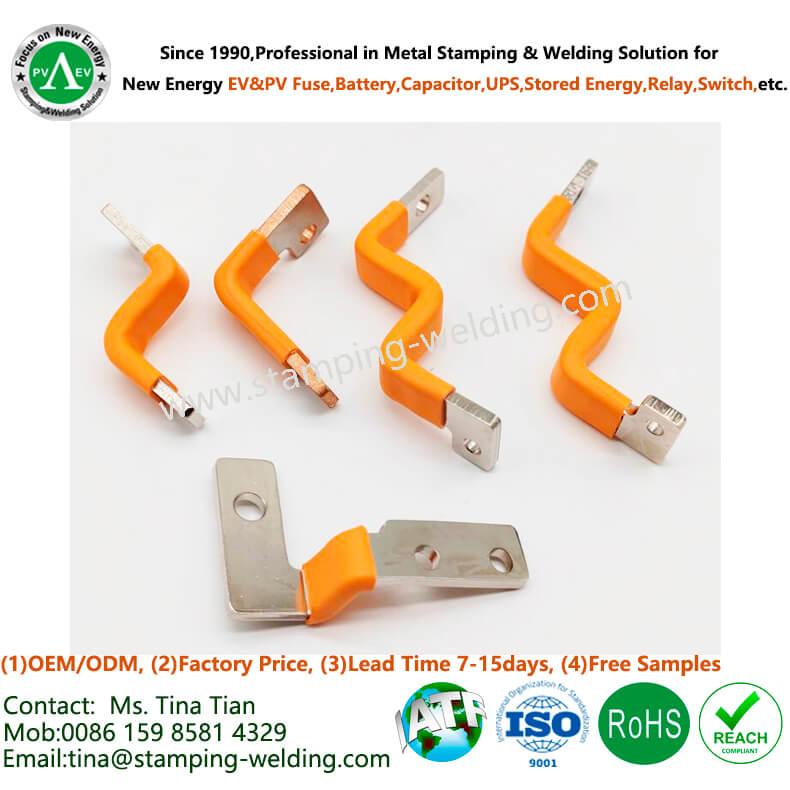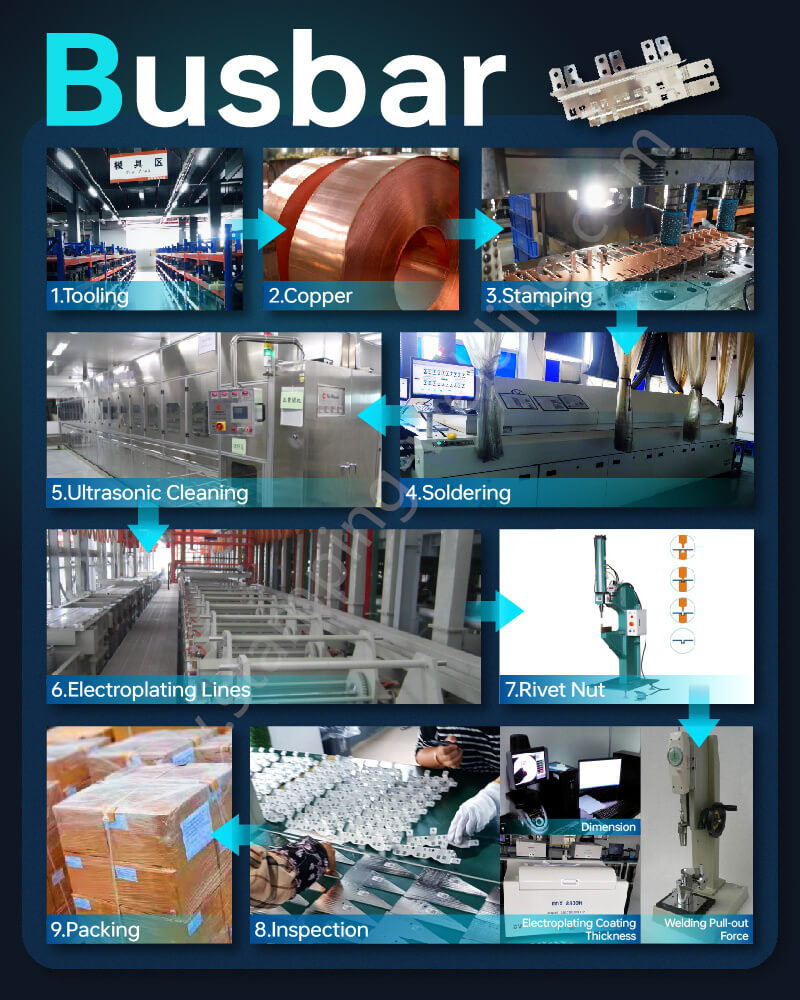

1- Products Name: PVC Dipped Battery Bus Bar
2- Base Material Standard:
GB : T2Y2 Copper
DIN: E-Cu58 (Number: 2.0065)
EN: Cu-ETP ( Number: CW004A)
ISO: Cu-ETP
UNS: C11000
JIS: C1100
BS: C101
Purity ≥99.99% Copper, Conductivity %IACS≥97, Hardness 80~110HV, Tensile Strength 245-345MPa, other material also can be customized.
3-Surface Treatments:
(3.1) Silver plating
(3.2) Tin plating
(3.3) Nickel plating
(3.4) Ultrasonic cleaning
Normally plated thickness is 3μm to 12μm, but all upon customers' request.
4- Insulation Options:
(4.1) PET insulation paper (brands USA GTS, GERMANY KREMPEL, etc with white or milky white colors)
(4.2) PVC dipping (orange and green are the most popular colors)
(4.3) Epoxy powder coating (orange, green and grey are the most popular colors)
(4.4) PE heat shrink tube (orange, green, black, red are yellow are the most popular colors)
Flame Retardant / Fire Resistance: UL94-V-0 or upon you request;
Operating Temperature: -45ºC to +150 ºC
5- Copper Busbar Resistance: ≤0.00001Ω
6- Copper Busbar load voltage 3500VDC to 5000VDC and current 100A to 2000A
7- Copper Busbar Assembly Fixtures: USA PEM stainless nuts, studs, standoffs, screws, etc
8- Free Samples:1-10pcs is allowed
9- Lead Time:Orders 7-10days,Samples 10-20days(including the tooling/die production of Copper Stamped Part);
10- Packing: pearl cotton/blister box inside and carton/pallet outside
11- Certifications: ISO9001, IATF16949, RoHS, REACH, etc.
12- Production Capacity: 50,000,000 pcs/month
13- Applications: film capacitors for new energy electric vehicles and hybrid vehicles, new energy vehicle battery packs, new energy photovoltaic energy storage, power appliances, distribution cabinets, rail transit, cloud server uninterruptible power supplies and other power systems.
PVC dipped battery bus bars refer to bus bars used in battery systems that have been coated with a layer of PVC (Polyvinyl Chloride) material. This coating serves various purposes, including insulation, protection against environmental factors, and enhancing the durability of the bus bars in battery applications. Here are key aspects related to PVC dipped battery bus bars:
1. Copper Busbar Material:
Copper: The PVC dipping bus bars themselves are typically made of highly conductive materials like copper or aluminum, providing efficient electrical connectivity within the battery system.
PVC Dipping Process:
Coating Application: The PVC dipping process involves immersing the bus bars in a PVC coating material. The coating adheres to the surface of the bus bars, forming a protective layer.
Uniform Coverage: The PVC dipping process is designed to achieve uniform coverage on all surfaces of the bus bars, including edges and corners. This ensures effective insulation and protection.
2. Copper Busbar Insulation:
Electrical Insulation: The primary purpose of PVC dipping Busbar is to provide electrical insulation for the bus bars. This insulation prevents direct contact with other conductive components, reducing the risk of electrical shorts.
Voltage Isolation: PVC insulation helps isolate the bus bars, preventing the flow of current between adjacent bars and enhancing the safety of the battery system.
3. Protection Against Environmental Factors:
Resistance to Moisture: PVC-coated bus bars offer resistance to moisture, protecting the underlying metal from corrosion. This is particularly important in battery systems where exposure to electrolytes or humid environments may occur.
Chemical Resistance: PVC coatings provide some level of resistance to certain chemicals, enhancing the durability of the bus bars in battery applications.
4. Mechanical Protection:
Abrasion Resistance: The PVC coating bus bar adds a layer of abrasion resistance, protecting the bus bars from physical damage that may occur during handling or installation.
Impact Resistance: The coating contributes to the overall mechanical strength of the bus bars, making them more resistant to impacts and external forces.
5. Customization:
Color Options: PVC coatings Busbars are available in various colors, allowing for customization based on application requirements or for color-coding purposes. This aids in easy identification and organization of components.
6. Ease of Installation:
Preventing Contact Issues: The PVC coating busbar simplifies the installation process by preventing direct contact between bus bars and other components. This reduces the need for additional insulation measures during installation.
7. Testing and Quality Control:
Insulation Testing: PVC-dipped battery bus bars undergo insulation testing to ensure that the coating meets specified electrical insulation requirements.
Visual Inspection: The coating is visually inspected for uniformity, absence of defects, and overall quality.
8. Application in Battery Packs:
Electric Vehicle (EV) Batteries: PVC-dipped battery bus bars are commonly used in electric vehicle battery packs to provide electrical connectivity between battery cells and modules.
Stationary Energy Storage: In stationary energy storage systems, such as those used in renewable energy applications, PVC-dipped bus bars may be employed to connect batteries and facilitate electrical flow.
PVC-dipped battery bus bars play a crucial role in ensuring the electrical safety, insulation, and longevity of battery systems, making them a suitable choice for various applications, including electric vehicles, renewable energy storage, and industrial battery installations.

Contact Information:
Ms.Tina Tian (Sales Manager&Technology Engineer)
Xiamen Apollo Stamping Welding Technology Co., Ltd
Apollo Electronic Components (Xiamen) Co.,Ltd
Add: No.2, Chengyi North Road, Jimei Software Park, Jimei District, Xiamen City, Fujian Province, China, 361022
Mob/WhatsApp/WeChat: 0086-15985814329
Email: tina@stamping-welding.com
Web: www.stamping-welding.com , www.china-electronic-components.com
Since 2010, professional in Metal Stamping & Welding Solutions for New Energy EV & PV Fuse, Battery, Capactior, Relay, Switch, ect!